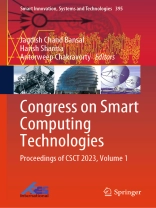This book presents high-quality research papers presented at Congress on Smart Computing Technologies (CSCT 2023) organized by SAU Center for Research and Innovative Learning (SCRIL), South Asian University, India, from 2–3 December 2023. The book extensively covers recent research in algorithms for smart computing, AI and machine learning in smart computing, edge computing algorithms, adversarial networks and autoencoders, data visualization, data mining, data analytics, machine learning, game theory, high-performance computing, mobile and ubiquitous platforms for smart environments, cloud/edge/fog computing technologies for smart systems, Internet of Things (Io T) and industrial Io T technologies for smart systems, smart device and hardware, security, privacy, and economics in smart environments, big data, healthcare informatics, smart precision agriculture, smart transportation, social network analysis, and human–computer interaction. The work is presented in two volumes.
Despre autor
Dr. Antorweep Chakravorty is an Associate Professor at the University of Stavanger. His current research and development work is in the field of applied Blockchains, Big Data, Large Scale Machine Learning, and Data Privacy. He has an interest in real-world problems, especially development of privacy enabled data-driven services in smart energy, healthcare, and smart city domains. Antorweep completed his Ph D. in 2015 with a thesis on Privacy Preserving Big Data Analytics at the University of Stavanger, Norway. Along with having a background in applied research in data-driven solutions, he is also involved in mentoring, teaching and supervision.
Dr. Jagdish Chand Bansal is an Associate Professor (Senior Grade) at South Asian University New Delhi and Visiting Faculty at Maths and Computer Science, Liverpool Hope University UK. He also holds visiting professorship at NIT Goa, India. Dr. Bansal obtained his Ph.D. in Mathematics from IIT Roorkee. Before joining SAU New Delhi, he worked as an Assistant Professor at ABV- Indian Institute of Information Technology and Management Gwalior and BITS Pilani. His Primary area of interest is Swarm Intelligence and Nature Inspired Optimization Techniques. Recently, he proposed a fission-fusion social structure based optimization algorithm, Spider Monkey Optimization (SMO), which is being applied to various problems in the engineering domain. He has published over 70 research papers in various international journals/conferences. He is the Section Editor (editor-in-chief) of the journal Methods X published by Elsevier. He is the series editor of the book series Algorithms for Intelligent Systems (AIS), Studies in Autonomic, Data-driven and Industrial Computing (SADIC), and Innovations in Sustainable Technologies and Computing (ISTC) published by Springer. He is also the Associate Editor of Engineering Applications of Artificial Intelligence (EAAI) and ARRAY published by Elsevier. He is the general secretary of the Soft Computing Research Society (SCRS). He has also received Gold Medal at UG and PG levels.
Harish Sharma is an Associate professor at Rajasthan Technical University, Kota in Department of Computer Science & Engineering. He has worked at Vardhaman Mahaveer Open University Kota, and Government Engineering College Jhalawar. He received his B.Tech and M.Tech degree in Computer Engg. from Govt. Engineering College, Kota and Rajasthan Technical University, Kota in 2003 and 2009 respectively. He obtained his Ph.D. from ABV – Indian Institute of Information Technology and Management, Gwalior, India. He is secretary and one of the founder member of Soft Computing Research Society of India. He is a life time member of Cryptology Research Society of India, ISI, Kolkata. He is an Associate Editor of “International Journal of Swarm Intelligence (IJSI)” published by Inderscience. He has also edited special issues of the many reputed journals like “Memetic Computing”, “Journal of
Experimental and Theoretical Artificial Intelligence”, “Evolutionary Intelligence” etc. His primary area of interest is nature inspired optimization techniques. He has contributed in more than 105 papers published in various international journals and conferences.












